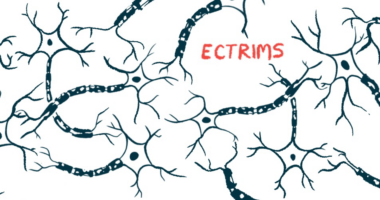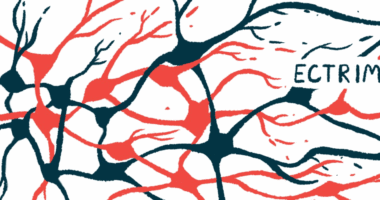#ACTRIMS2020 – EHP-101 Shows Promise in Early Studies; Phase 2 Trial Ahead

#ACTRIMS2020, photo by Jose (Bionews)
Emerald Health Pharmaceuticals’ investigational cannabidiol-derived EHP-101 continues to show potential to ease inflammation and myelin loss (demyelination) — a hallmark of multiple sclerosis (MS) — according to data from healthy volunteers and a mouse model of MS.
The data support the advance of EHP-101’s clinical development into the Phase 2 stage.
The findings were presented in two posters at the Americas Committee for Treatment and Research in Multiple Sclerosis (ACTRIMS) Forum 2020, held in Florida Feb. 27-29.
Cannabinoids (the cannabis plant’s active components) and other elements involved in the endocannabinoid system — a complex modulatory network involved in brain development, memory, movement control, hormone production, and immune reactions — are known to have neuroprotective effects.
EHP-101 (previously known as VCE-004.8) is an oral formulation of a new molecule derived from synthetic cannabidiol (CBD), a non-psychoactive cannabinoid that has gained increased scientific interest in recent years.
EHP-101 was designed to be therapeutically superior to other CBD products due to its greater activity via activation of the cannabinoid receptors CB2 and PPAR-gamma, previously shown to help prevent inflammation and loss of myelin — the protective coat around nerve fibers that allows effective nerve cell communication.
In addition, EHP-101 activates the hypoxia-inducible factor (HIF) pathway, which regulates immune responses associated with neuroprotection and myelin regeneration (remyelination).
Previous studies in mouse models of MS showed that EHP-101 effectively lessened neuroinflammation and prevented the loss of myelin, nerve cell damage, and exacerbated immune responses.
These positive data supported the launch of a Phase 1 clinical trial (NCT03745001) evaluating EHP-101’s safety, tolerability, and pharmacokinetics (uptake, distribution, and elimination in the body) in 104 healthy volunteers in Australia.
In the poster, “First-in-human Study With EHP-101 Oral Solution Of A Synthetic Cannabidiol Derivative Enables The Initiation Of A Phase II Study In Multiple Sclerosis,” researchers shared final data from the Phase 1 study.
Participants were randomly assigned to receive either one of 12 different single and multiple doses of EHP-101 or a placebo. A total of 48 patients (six in each dose group) received a single dose of EHP-101 (doses: 0.91, 3, 9, 20, 25, 50, 100, or 185 mg), 32 participants (eight in each group) were given EHP-101 once or twice a day for a week (ranging from 20 mg to 100 mg per day), and 24 patients (two in each dose level) received a placebo.
Results showed that EHP-101 was well tolerated at all dose levels tested, with reports of only mild to moderate adverse events, and no significant abnormalities in several clinical parameters.
The most common adverse events reported among participants receiving EHP-101 or a placebo included headache, feelings of pins and needles in the limbs (paresthesia), blurred vision, and abdominal pain.
Pharmacokinetics analyses revealed longer availability and higher EHP-101 exposure when administered in a fed state (as opposed to a fasted state, with no food).
A 20 mg single dose of EHP-101 resulted in blood levels predicted to have therapeutic effects, and a week of 50 mg EHP-101 treatment per day (single dose or 25 mg twice per day) achieved the targeted therapy exposure, helping to select the optimal dose and treatment regimen for a future Phase 2 trial.
A preliminary analysis of EHP-101-associated biomarkers after a week of treatment supported the therapy’s multiple mechanisms of action, with increased levels of molecules associated with the HIF pathway and lower levels of inflammatory and immune molecules associated with CB2 and PPAR-gamma activation. Additional quantitative analyses are ongoing.
Overall, the data suggested that “single doses up to 185 mg and multiple doses up to 50 mg BID [two times per day] for seven days were well tolerated by healthy subjects,” and support “the start of clinical studies in MS patients and other autoimmune disorders,” the researchers wrote.
In a second poster, “Oral Administration of EHP-101 Promotes Remyelination in White Matter in the Cuprizone/Rapamycin Mouse Model of Multiple Sclerosis,” researchers presented further positive effects of EHP-101 in a mouse model of MS with more extensive demyelination and slower spontaneous remyelination than those previously tested.
The “augmented cuprizone model” involves the administration of a combination of cuprizone (a demyelination-inducing agent) with rapamycin (an immunosuppressive agent that delays remyelination) for 12 weeks in healthy mice.
Researchers evaluated EHP-101’s potential to regenerate myelin in the brain’s grey and white matter in these mice. Grey matter contains mainly the nerve cells’ body, while white matter consists of nerve cells’ fibers (surrounded by myelin).
Mice treated with higher doses of EHP-101 (10 and 20 mg/kg) for six weeks showed significant, dose-dependent remyelination of demyelinated axons in white matter, but not in grey matter, compared with those receiving a placebo.
“In this augmented cuprizone model of demyelination, oral administration of EHP-101 induced significant remyelination of demyelinated axons in white matter,” the researchers said.
Taken together, the findings support the evaluation of EHP-101 in MS patients in a future Phase 2 clinical trial
“The profile of EHP-101 observed in our large first-in-human study is consistent with the extensive preclinical data we have generated to date,” Jim DeMesa, MD, Emerald’s CEO, said in a press release.
“This Phase 1 study [in healthy volunteers], along with the remyelination of axons [nerve fibers] demonstrated in our nonclinical studies, provides the rationale for us to advance EHP-101 into Phase 2 development for people living with MS,” DeMesa said.
EHP-101 is also being evaluated as a potential treatment for systemic sclerosis, a chronic, inflammatory, autoimmune disease. Based on positive preclinical data and safety results from this Phase 1 study, Emerald Health has already initiated a Phase 2 trial testing EHP-101 in people with systemic sclerosis.






